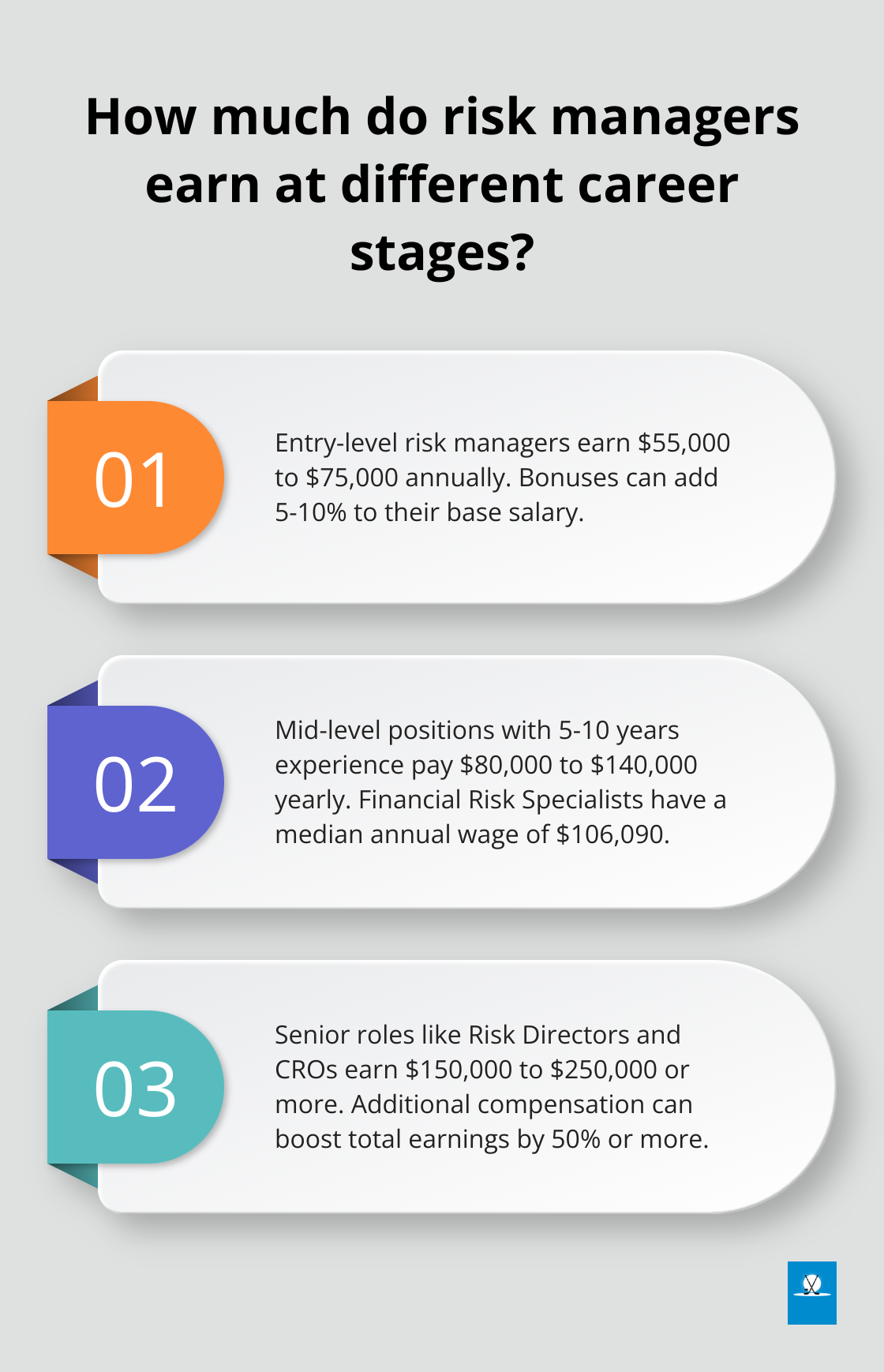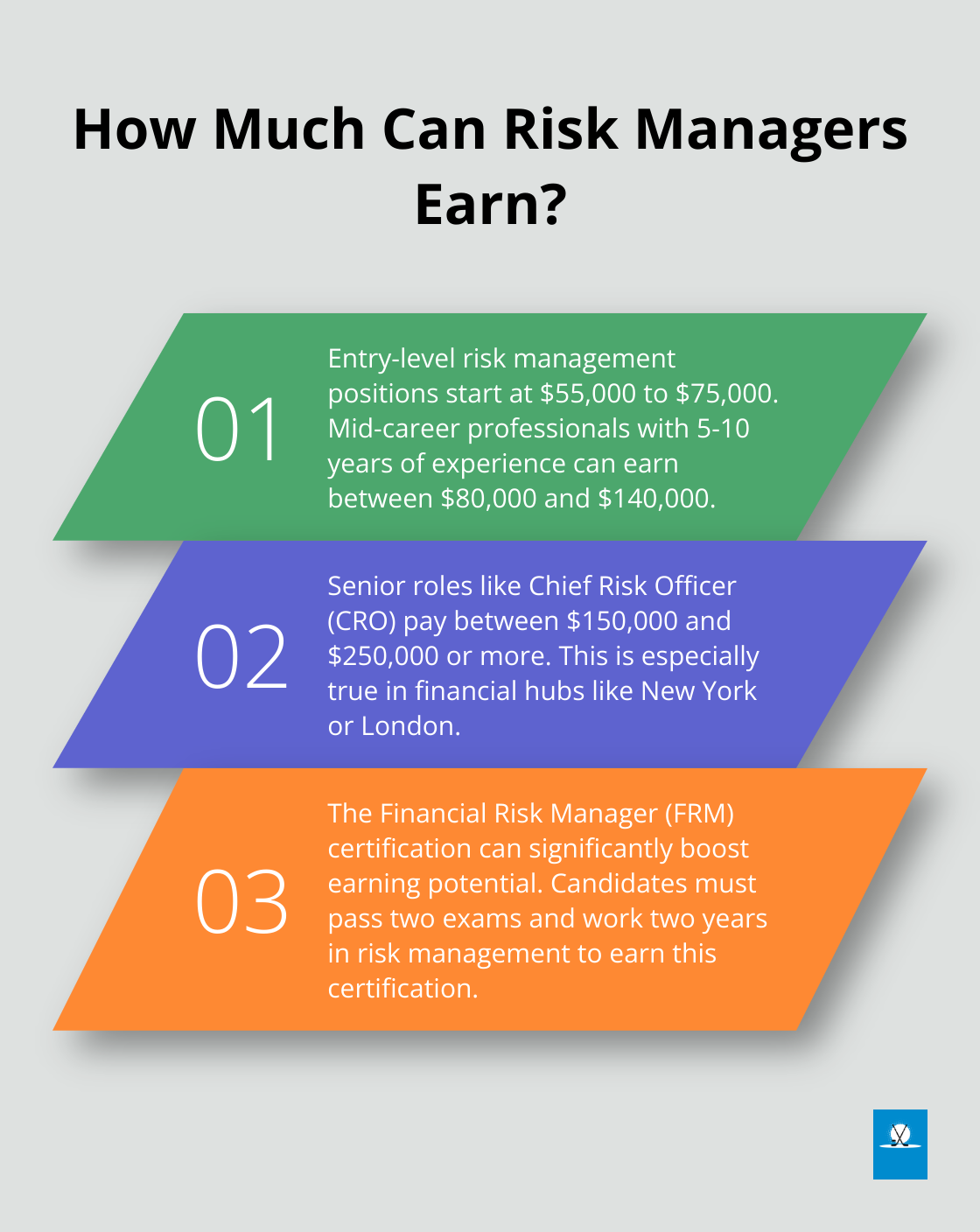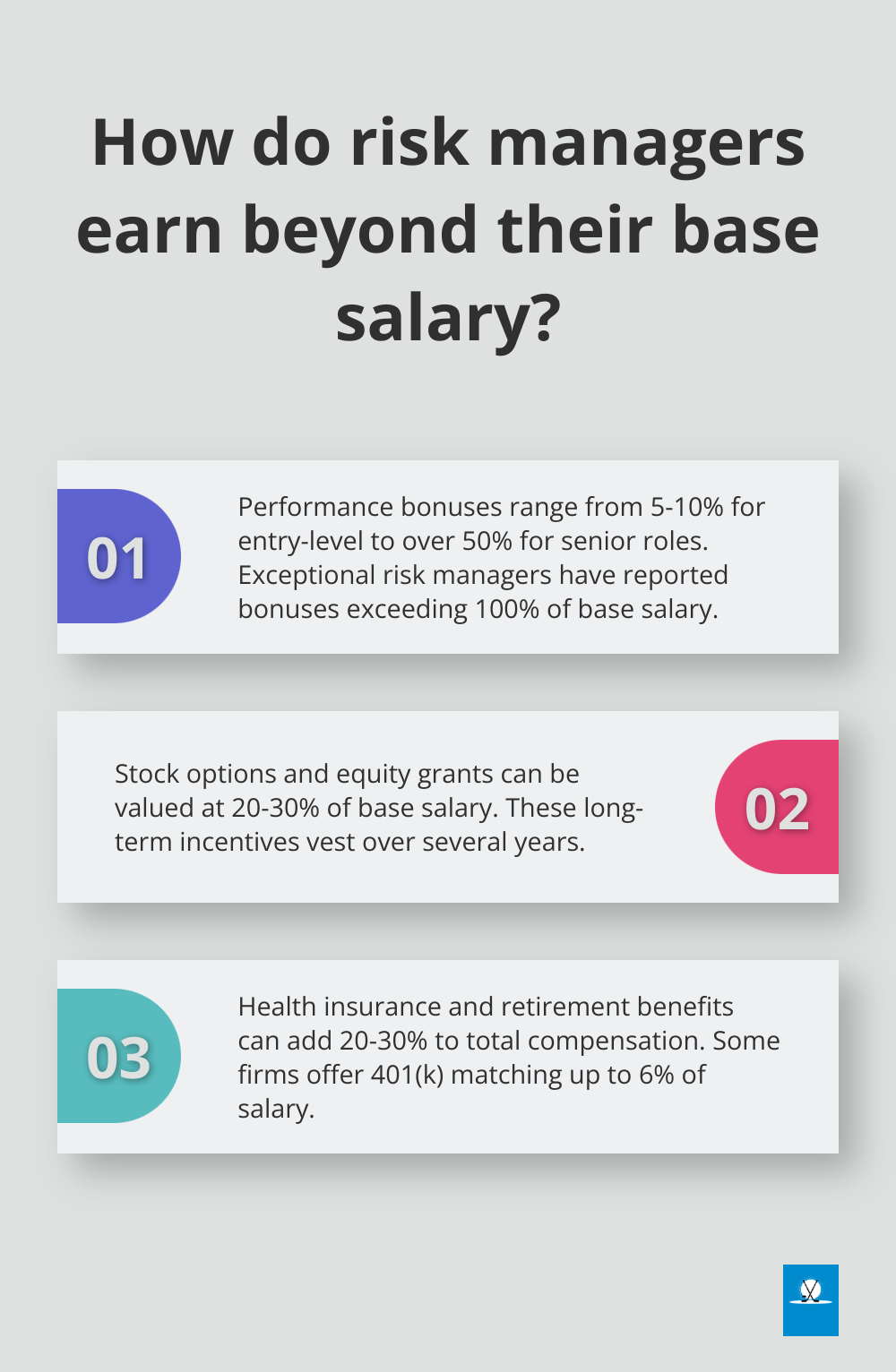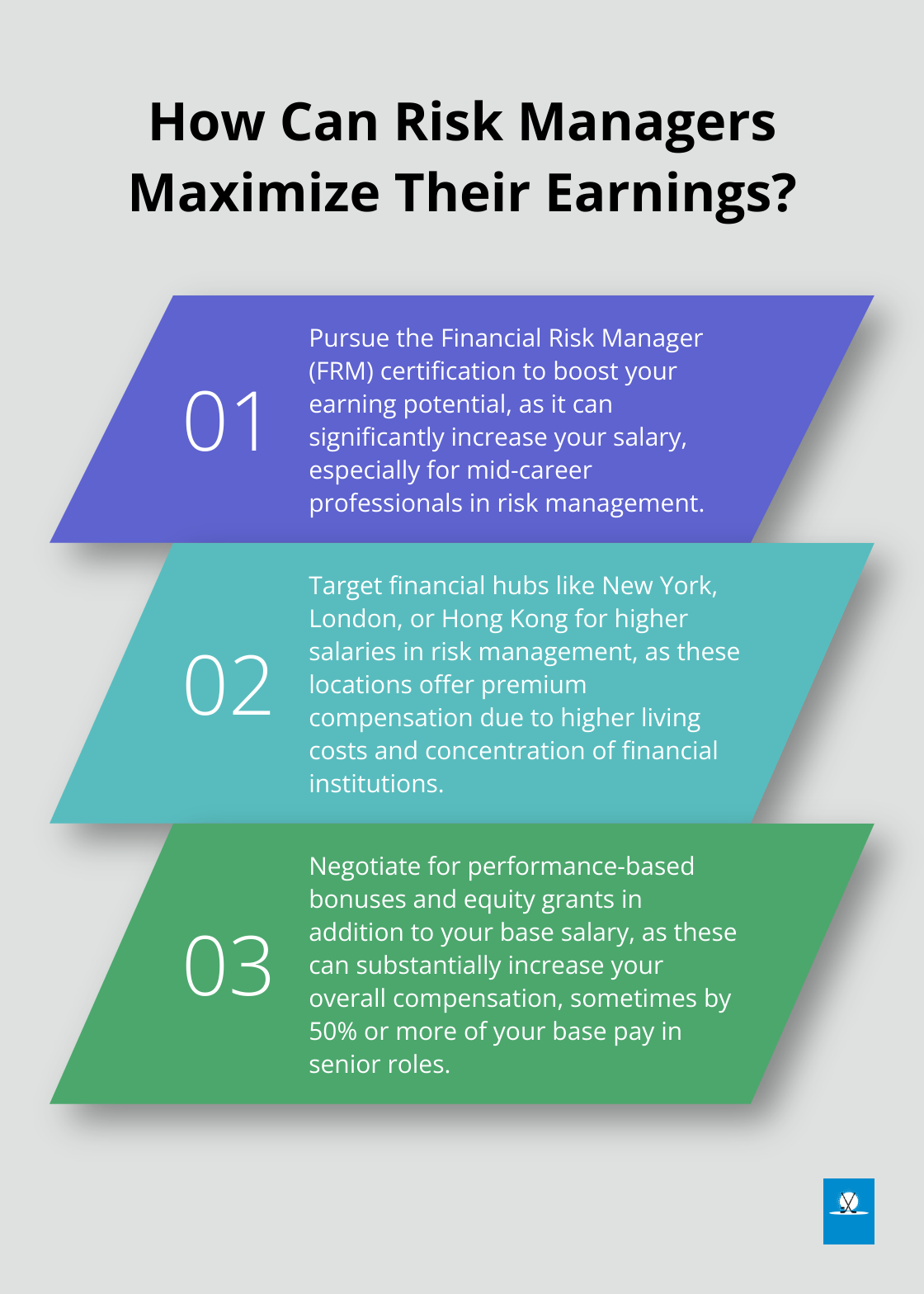At Pro Hockey Advisors, we often field questions about career paths beyond the rink. One area that’s caught our attention is the lucrative field of risk management in finance.
Understanding risk management finance salaries is crucial for those considering this career path. Let’s explore what professionals in this field can expect to earn and the factors that influence their compensation.
What Do Risk Management Professionals Earn?
Entry-Level Salaries
Risk management in finance offers a lucrative career path with competitive salaries across various levels of experience. Fresh graduates who enter risk management can expect a solid starting salary. According to recent data, entry-level FRMs can earn between $55,000 and $75,000 annually, with bonuses adding 5–10%. This figure can vary based on factors like location and specific role, but it provides a strong foundation for career growth.
Mid-Career Earnings
As professionals gain experience, their earning potential increases significantly. Mid-level risk management positions, which typically require 5-10 years of experience, command salaries ranging from $80,000 to $140,000 per year. The U.S. Bureau of Labor Statistics reports that Financial Risk Specialists earn a median annual wage of $106,090, which highlights the financial rewards of progressing in this field.
Senior-Level Compensation
Senior risk management professionals, including Risk Directors and Chief Risk Officers (CROs), can expect substantial compensation packages. Salaries for these roles often range from $150,000 to $250,000 or more.

It’s worth noting that these figures represent base salaries. Many risk management professionals, especially at senior levels, receive additional compensation in the form of bonuses, profit-sharing, and stock options. These can significantly boost total earnings, sometimes by 50% or more of the base salary.
Geographic Variations
Location plays a crucial role in determining salaries. Financial hubs tend to offer premium compensation.
Factors Influencing Earnings
While these figures paint an attractive picture, it’s important to understand that salaries can vary widely based on factors such as industry sector, company size, and individual performance. Continuous learning and professional development, such as obtaining certifications like the Financial Risk Manager (FRM), can help professionals climb the salary ladder more quickly.
The field of risk management in finance presents numerous opportunities for those seeking a career with strong earning potential and room for growth. As we explore the factors that influence these salaries in more detail, we’ll uncover additional insights into what shapes compensation in this dynamic field.
What Drives Risk Management Salaries?
Education and Certifications: A Solid Foundation
Education forms the bedrock of risk management salaries in finance. A bachelor’s degree often serves as the minimum requirement, but professionals with master’s degrees or MBAs typically command higher salaries. The Financial Risk Manager (FRM) certification stands out as particularly valuable. To earn the FRM certification, candidates must pass two rigorous exams and also work two years in the field of risk management. This certification can significantly boost earning potential, especially for mid-career professionals.
Experience: The Salary Accelerator
Years of experience directly correlate with higher salaries in risk management. Entry-level positions start around $55,000 to $75,000, but this figure can quickly escalate. Mid-career professionals (with 5-10 years of experience) often earn between $80,000 and $140,000. Senior roles like Chief Risk Officer (CRO) pay between $150,000 and $250,000 or more, particularly in financial hubs like New York or London.
Location: The Geographic Factor
Geographic location significantly impacts salaries. Financial hubs like New York, London, and Hong Kong offer the highest compensation due to higher living costs and concentration of financial institutions.
Industry and Company Size: Varied Opportunities
The financial sector you work in and the size of your employer also affect your earning potential. Hedge funds, asset management firms, and fintech companies often offer higher salaries compared to traditional banking. Larger companies typically have more resources to offer competitive compensation packages, including substantial bonuses and benefits.
Negotiation Skills: The Personal Touch
While these factors significantly influence salaries, individual negotiation skills and performance also play key roles in determining final compensation. Understanding your value and leveraging your unique skills and experiences can make a substantial difference when discussing salaries.

As we move forward, we’ll explore the additional compensation and benefits that often accompany base salaries in risk management roles, providing a more comprehensive picture of the total rewards in this field.
Beyond the Base Salary: Additional Earnings for Risk Managers
Risk management professionals in finance often receive compensation packages that extend far beyond their base salaries. These additional benefits can significantly boost overall earnings and provide long-term financial security.
Performance-Based Rewards
Many financial institutions offer substantial performance bonuses to risk management professionals. These bonuses range from 5-10% of base salary for entry-level positions to over 50% for senior roles. At top-performing firms, exceptional risk managers have reported bonuses exceeding 100% of their base salary. This performance-linked compensation structure aligns individual success with company goals, which motivates risk managers to excel in their roles.
Equity and Long-Term Incentives
Stock options and equity grants are common in the finance sector, particularly for mid to senior-level risk management positions. These long-term incentives can provide substantial wealth accumulation opportunities. For instance, a risk manager at a major investment bank might receive stock options valued at 20-30% of their base salary (vesting over several years). This not only boosts overall compensation but also fosters loyalty and long-term commitment to the company.
Comprehensive Benefits Packages
Financial institutions typically offer robust health insurance and retirement plans. Many provide premium health coverage (including dental and vision) with low out-of-pocket costs. Retirement benefits often include generous 401(k) matching programs, sometimes up to 6% of salary. Some firms even offer pension plans, though these have become less common. These benefits can add significant value to a risk manager’s total compensation package, sometimes equating to 20-30% of base salary.
Career Advancement Opportunities
Professional development is a key component of compensation in risk management. Many firms invest heavily in their risk management talent, offering paid certifications, conference attendance, and advanced degree programs. For example, some companies cover the full cost of obtaining the Financial Risk Manager (FRM) certification, which can cost several thousand dollars. Others provide tuition reimbursement for MBA programs, potentially worth over $100,000. These opportunities not only enhance skills but also increase earning potential over time.

Final Thoughts
Risk management finance salaries offer substantial earning potential across all career stages. Entry-level professionals can expect $55,000 to $75,000 annually, while senior roles often exceed $250,000. Education, experience, location, and industry sector significantly impact compensation in this field.

The future outlook for risk management salaries remains positive due to increasing market complexity and evolving regulatory requirements. Base salaries represent only part of the total compensation package, with many professionals receiving substantial bonuses and benefits (sometimes up to 50% of their base salary). Continuous learning and skill development are essential for maximizing earning potential in this dynamic field.
At Pro Hockey Advisors, we understand the importance of strategic career planning across industries. While our focus is on professional hockey, the principles of career optimization apply to risk management in finance as well. Professionals who stay ahead of industry trends will position themselves for long-term success and competitive salaries in this rewarding field.


